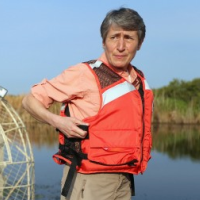U.S. Blocks New Mining Outside Yellowstone National Park
 Sally Jewell during visit to Montana (photo: Getty Images)
Sally Jewell during visit to Montana (photo: Getty Images)
By Matthew Brown, Associated Press
PRAY, Mont. (AP) — U.S. officials on Monday blocked new mining claims outside Yellowstone National Park as the Obama administration races in its last days to keep industry out of natural and environmentally sensitive areas.
Mining claims on 30,370 acres north of the nation's first national park would be prohibited for at least two years while a long-term ban is considered, Interior Secretary Sally Jewell said during a visit to Montana's scenic Paradise Valley.
Details were obtained by The Associated Press in advance of the formal announcement.
Interior officials last week blocked new oil drilling in the Arctic Ocean and cancelled 25 oil and gas leases in western Colorado and 15 in northwestern Montana.
Republicans and industry representatives have criticized the administration's eleventh-hour actions to limit development. They've promised to seek their reversal once Obama leaves office and Donald Trump takes charge of the White House.
The latest move came after a pair of gold exploration proposals north of Yellowstone drew strong opposition from business owners, environmentalists and Montana elected officials. Local officials worry mining could hurt an economy heavily dependent on tourism and outdoor recreation.
Jewell hiked a rocky trail to examine the landscape surrounding one of the mining sites, beneath the snow-capped peaks of the Absaroka Mountains. She said she hoped the temporary ban would discourage the projects' sponsors and shield Yellowstone and surrounding areas of Custer-Gallatin National Forest from development.
The two-year prohibition would not explicitly block the pending proposals, both of which involve private lands. However, Jewell and other government officials said it would make large-scale mining more difficult if the projects were expanded onto public lands.
"This is right on the doorstep of Yellowstone National Park, one of the most amazing places in the world," Jewell said. "It needs to be part of a larger ecosystem and this forest is part of that ecosystem. Mining will damage that. It will damage the ability of the animals to migrate. It will impact potentially the watershed. It could impact the geothermal features."
Recreation and other activities still will be allowed in the area.
A Canadian company, Lucky Minerals, has applied to the Montana Department of Environmental Quality to explore for gold and other minerals north of Yellowstone near Emigrant. Another company, Spokane, Washington-based Crevice Mining Group, is seeking permission to explore for gold near Jardine, just over Yellowstone's northern boundary.
Lucky Minerals Vice President Shaun Dykes said he was "disgusted" with Monday's announcement and said he'd received no advance notice from federal officials. The administration's action, he said, could scare off potential investors who can easily steer their money to mining projects elsewhere.
"They're sending a huge message to mining and exploration (companies), saying you're not welcome in Montana," Dykes told the AP in a telephone interview.
He accused Jewell of trying to "ram it through before Trump takes office" and said the reserves his company is targeting hold up to 10 million ounces of gold. If Lucky Mineral's plans get stopped, Dykes said the company would be entitled to compensation for its foregone profits.
Jewell said the recent actions were in the works well before the election and the administration was seeking merely to wrap up its longstanding agenda before leaving office in early January.
Crevice Mining Group managing director Michael Werner said Jewell and other officials were wrong to think his project could be derailed by Monday's actions. Because the mine would be relatively small — roughly 300 tons of ore removed daily — Werner said the company's private land holdings were sufficient to see the project through to completion.
U.S. Sen. Jon Tester had urged the administration to intervene to help stop mining in the area. The Montana Democrat said following Jewell's announcement that he would introduce legislation in the next Congress to make the prohibition on new mining claims permanent.
The Interior Department ban can extend a maximum of only 20 years, officials said.
Both of the proposed exploration sites have a history of mining. However, in recent decades they've become more closely associated with the natural amenities of Yellowstone and the surrounding Absaroka-Beartooth Wilderness.
Opponents argue that mining would industrialize wild areas populated by grizzly bears, bighorn sheep and other wildlife and harm streams that drain into the Yellowstone River.
To Learn More:
U.S. Approves Coal Mine Expansion, Seeing Minor Climate Impact from 160-Million-Ton Carbon Dioxide Output (by Matthew Brown, Associated Press)
Forest Service Accused of Imperiling Wildlife Habitat with Montana Silver Mine Project (by Philip A. Janquart, Courthouse News Service)
Coal Industry Congressman Wants Companies to Pay Less in Royalties to U.S. (by Noel Brinkerhoff, AllGov)
- Top Stories
- Unusual News
- Where is the Money Going?
- Controversies
- U.S. and the World
- Appointments and Resignations
- Latest News
- Musk and Trump Fire Members of Congress
- Trump Calls for Violent Street Demonstrations Against Himself
- Trump Changes Name of Republican Party
- The 2024 Election By the Numbers
- Bashar al-Assad—The Fall of a Rabid AntiSemite






Comments